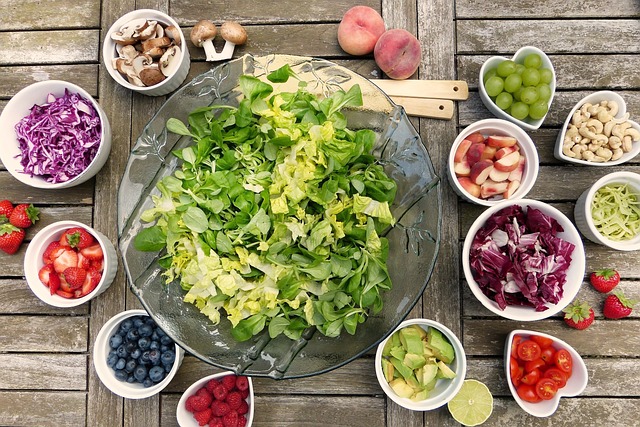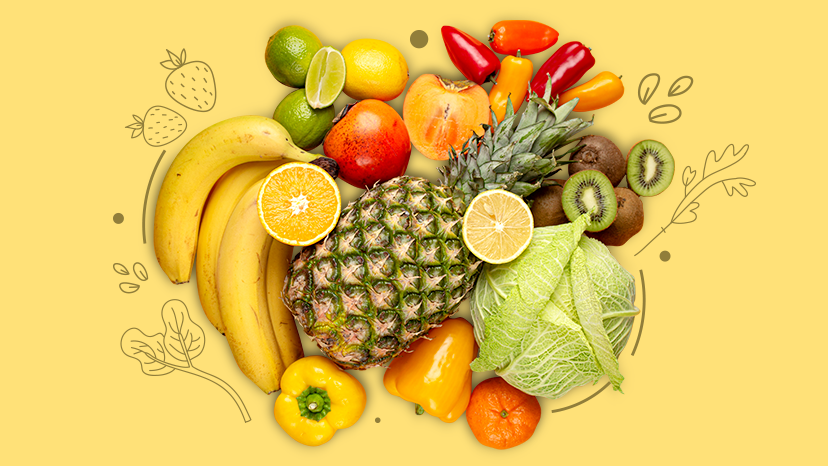Table of Contents
How can fruits and vegetables help manage your weight?
If you’re trying to manage your weight, you might be thinking about cutting back on calories. But did you know that including more fruits and vegetables in your diet can help you reach your goals?
Fruits and vegetables are packed with nutrients that can help boost your metabolism and keep you feeling full. They’re also low in calories, so they can help you cut down on other foods that are higher in fat and sugar. Read on for tips on how to include more fruits and vegetables in your diet.

How can I eat fruits and vegetables every day?
If you’re trying to eat healthily and manage your weight, you may wonder how many fruits and vegetables you should eat in a day. It depends on your caloric needs.
If you eat 1,600 calories a day, you should aim for 2 cups of fruit and 2.5 cups of vegetables. But if you’re eating more calories, you’ll need more fruits and vegetables to reach these goals.
|
Meal |
Fruits/Vegetables |
Why Is It Beneficial? |
Approximate Calories / 100 gm |
|
Breakfast |
1) Citrus fruits- Orange, lemon or grapefruit 2) Apples 3) Pomegranate |
Excellent source of vitamin C, fibre and potassium. Full of antioxidants and antibacterial agents. Best for boosting health. Antioxidants in pomegranate can prevent colon and breast cancer. |
40-50
50 70 |
|
Lunch |
1) Broccoli 2) Carrots 3) Green Beans |
Rich in vitamins A, C and K. Rich in vitamin A. Promotes vision. High fibre improves digestion and reduces sugar levels. Rich in vitamins A, C and K. Lower bad cholesterol. |
34
41 31 |
|
Dinner |
1) Eggplant 2) Beetroot 3) Cauliflower |
Contains compounds that improve heart health. Low in carbohydrates. Rich in folate, which promotes the development of red blood cells. It also improves insulin sensitivity. Contains vitamins C, A and K. One of the few vegetables that contain choline, which boosts cell development in unborn children. Highly recommended for pregnant women. |
25
43 25 |
Here are some tips for including fruits and vegetables in your diet:
-
Make a smoothie for breakfast or a snack using frozen fruit, milk, and yoghurt.
-
Add diced fruit to your oatmeal or cereal.
-
Enjoy a fruit salad as a side dish or snack.
What portion of a meal should include fruits and vegetables?
Most health authorities recommend that adults consume at least five servings of fruits and vegetables daily. A serving is typically one medium-sized fruit or vegetable or half a cup of cooked or chopped fruits or vegetables.
While there are no rules about how much of your meal should come from fruits and vegetables, aiming for half is a good goal.
Why should we include fresh fruits and vegetables in our diet?
There are many reasons to include fresh fruits and vegetables in our diet.
-
They are a good source of nutrients. Nutrients are essential for our bodies to function properly.
-
Fresh fruits and vegetables are also good sources of fibre. Fibre helps keep our digestive system healthy and prevents constipation. It can also help lower cholesterol and blood sugar levels.
-
Another reason to eat fresh fruits and vegetables is that they contain phytochemicals. Phytochemicals are natural compounds that can help protect our cells from damage.
What veggies should I eat every day?
There are a lot of vegetables that you can eat every day to help with weight management. Here are some of the best ones:
-
Leafy greens: These are low in calories and fibre, which helps keep you feeling full. Spinach, kale, and collards are all great choices.
-
Cruciferous vegetables: Broccoli, Brussels sprouts, and cabbage are all good options. They’re also low in calories and high in nutrients.
-
Root vegetables: Carrots, beets, and sweet potatoes are great roots to include in your diet. They’re filling and packed with nutrients like fibre and vitamins.
-
Squash: Both winter squash and summer squash are good choices. They’re low in calories and have a lot of water content, which makes them filling.
-
Tomatoes: Theyare a great source of antioxidants and can help protect against disease.
What is the healthiest fruit?
There are many different fruits and vegetables, each with a unique nutritional content. While there is no one “healthiest” fruit or vegetable, incorporating a variety of fruits and vegetables into your diet can help you reach your health goals.
Fruits and vegetables are good sources of vitamins, minerals, and fibre. They can also help you feel full and satisfied after eating, aiding in weight management. When choosing fruits and vegetables, aim for a variety of colours and varieties to get the most benefit. And don’t forget to wash them thoroughly before eating!
Why are fruits and vegetables important for good health?
Including fruits and vegetables in your diet is a great way to help manage weight. By getting the right mix of nutrients, you can keep your metabolism strong and make it easier to lose or maintain a healthy weight. Plus, adding more fruits and vegetables to your diet can help improve your overall health and well-being. So if you’re looking to manage your weight in a healthy way, be sure to include plenty of produce in your meals and snacks.















